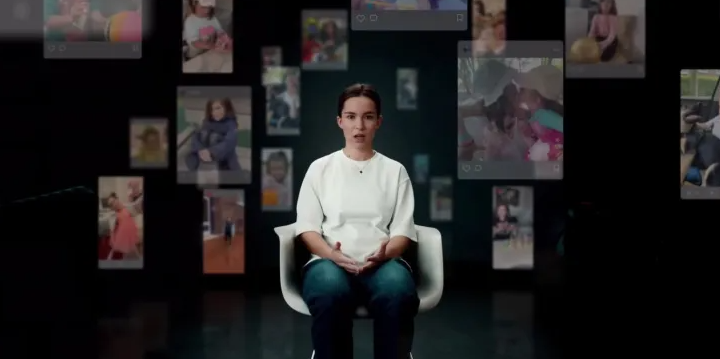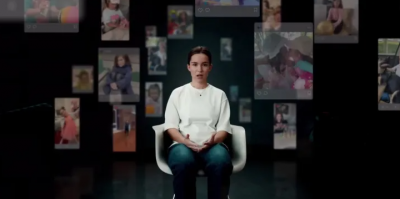More than 1500 photos are posted of each child on social media before they turn five years old. Often, a child may even establish a digital footprint before birth, as parents share ultrasound images joyfully announcing their upcoming arrival. Later, this joy can turn into tragedy as the accumulation of images creates a significant threat, making children easy targets for hackers who could exploit their features, voice, or image for malicious and fraudulent purposes, turning a smiling face into a "wanted" poster or possibly prey for families promoting pornography.
One mother summarizes her experience with sharing her family's privacy online, crying out for those who still post pictures without understanding what their children could face: "They digitally kidnapped my family and used those images in a diary for a family that does not reflect my values and ethics." Ironically, this digitally kidnapped family has gained followers and fame vastly exceeding their real-life numbers. In parallel with this mother's cry, there are rising complaints from mothers shocked to see images of their children on sites that encourage child abuse, highlighting the unforgivable sin of parents who present images of their children in near-naked states or from beach trips, offering them on a silver platter to sites that lack accountability or oversight.
In light of the growing incidence of identity theft and image manipulation through artificial intelligence, the German telecommunications company Deutsche Telekom launched a widespread and alarming advertising campaign, shocking parents who have become accustomed to sharing pictures of their children online without understanding the downside. The video release coincides with a study confirming that 92% of American children have some form of online presence by the age of two. As a result, all privacy is stripped away, and family sanctity is violated as they fall prey to a voracious cadre of hackers.
**The Shocking Video**
Deutsche Telekom's campaign spread widely due to its stark warning about the potentially devastating consequences of parents posting pictures of their children online. The video, which has been viewed more than 5.5 million times on social media in the past two days, demonstrates how easily a child's image can be manipulated using artificial intelligence (AI). It highlights the story of nine-year-old "Ella." Like many parents today, Ella's mother regularly posts videos and photos of her daughter on social media. However, Ella's parents never considered how "sharing" could ruin their daughter's future.
In the advertisement, a fake version of Ella is generated, appearing much older with the help of AI, created using just one photo shared by her parents online. In the video, this "fake Ella" can walk and talk like a real person. The terrified parents face the screen in disbelief as they watch the film in a cinema. The deception illustrates the dire consequences they could face after posting pictures and videos of their daughter on social media.
The advertisement clearly explains how children whose pictures are shared online can become victims of identity abuse, deep fake deception, exploitation in pornography, and even be implicated in crimes they did not commit.
**A Study**
Adweek reports that some studies predict that by 2030, nearly two-thirds of identity fraud affecting young generations will result from "sharing." It has shown that a five-year-old child has likely already uploaded around 1500 images online without parental consent.
**Zuckerberg's Actions**
Last week, a photo shared by Meta’s CEO, Mark Zuckerberg, sparked controversy on social media when he posted a family photo on Instagram, concealing the faces of his older children with emojis while leaving their newborn's face uncovered. This revealed Zuckerberg's awareness that his older children's faces have developed enough to be recognized by strangers online and through facial recognition programs.
**Children as Targets**
American Meredith Steele, a 35-year-old mother of two, warns parents to stop sharing pictures of their children online after her family was "digitally kidnapped." Steele recounts her ordeal: "By chance, I found a fake account of my family. My children had new names and identities, with embarrassing comments chosen by the hacker to promote their malicious ideas through our public diary online." She notes, "They were playing with my children like puppets, choosing their voices, looks, and thoughts. They had emotionally invested in them." Steele, who often shares photos of her family’s daily life on her public Instagram page, reported the fake account, but the social media company failed to take any action, forcing her to block the account herself. She states, "I felt like a bad mother," admitting having no prior knowledge of safety concepts when she began sharing images of her young children.
According to investigations on digital kidnapping, the majority of hackers are teenage girls and young women who use images to role-play in virtual motherhood games. This digital kidnapping can lead to real cybercrimes such as child identity theft.
**More than a Brand**
American photographer Andrea's experience with digital kidnapping is summarized in a Facebook post, describing an incident she faced after years of posting pictures of her children on her public page while promoting brands. By chance, she noticed an anonymous follower, raising suspicions. When she accessed the follower's profile after accepting a friend request, she found over 4,000 images of naked and semi-naked children, including photos of her own children taken at the beach. When she requested removal of the images, the site, seemingly dedicated to those obsessed with child exploitation, banned her. Andrea expresses her regret that her children's photos are still displayed on the site, despite her failure to delete them.
**The Police Perspective**
Victoria’s cybercrime expert, Officer Susan McLean, defines digital kidnapping as a form of identity theft, stating, "This happens when someone takes a child's photo from social media and repurposes it under new names and identities, often claiming that the child is theirs." She references various incidents in recent years, including a 2015 case where an individual took a photo of a child aged 18 months from a blog’s Facebook page and posted it on their profile, acting as if it were their own child.
She adds, "As children begin to explore the internet, they need protection through applications like Kaspersky Safe Kids 2020, which allows for the implementation of parental control tools, ensuring that kids do not access websites or content they shouldn’t see."
**The Cycle of Theft and Kidnapping**
Identity theft poses a significant concern. Hackers need only a child's name, address, and date of birth to steal their identity. Photos and captions often include such information. The first day of school posts are particularly high-risk, as parents might inadvertently disclose sensitive information, such as teacher names, school names, or even home addresses.
Experts recommend: "If you decide to post pictures of your children, keep the details to a minimum. Check the backgrounds of photos to ensure they provide no hints about where you live. Never include teacher or school names. Also, make sure your privacy settings are not set to 'public.' It's also wise to ask friends and family to refrain from using your child's photos or videos. Finally, if your child is over four, ask for their permission before posting a picture."
**Conscience Check**
According to a study conducted in the UK in 2020, parents post around 1500 photos of their children online before the age of five, with nearly one-third of parents surveyed admitting they never thought to seek the child’s consent before posting, while 55% confirmed they were unconcerned about the consequences.
While parents' posts may seem harmless enough, studies estimate that "sharing" will play a role in two-thirds of identity fraud cases facing youth by 2030. Experts say parents also inadvertently expose their children to the risks of hacking, facial recognition tracking, and sexual abuse: other online threats to privacy and security stemming from excessive sharing on social media.
Therefore, experts collectively advocate the phrase they promote: "Before sharing, check your conscience."




